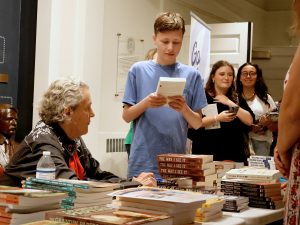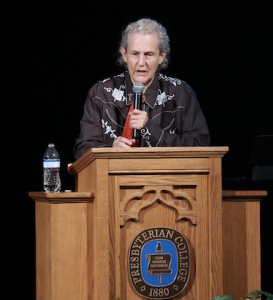Dr. Temple Grandin Champions Diverse Minds at Presbyterian College’s 10th Annual Charles Chadwell Special Education Institute
August 20, 2024Famed author, academic, and speaker Dr. Temple Grandin opened her keynote address to the 10th annual Charles Chadwell Special Education Institute at Presbyterian College with a simple observation with a profound impact.
“You have to realize that people can think differently,” she said. “I didn’t know until I was in my late 30s that other people don’t think in pictures the way I think.”
An extreme visual thinker, Grandin – who is autistic – uses words to narrate the pictures in her imagination. It’s an approach that diverges from what is often thought to be a “typical” way of thinking, but for all of Grandin’s life it has meant she has the ability to notice visual details that others often miss. This has played a tremendous role in her career, and she says that many individuals – particularly those with autism spectrum disorder like herself – possess exceptional visual thinking abilities.
Speaking in front of a near-capacity crowd of educators, parents, and community members gathered in PC’s Belk Auditorium, Grandin discussed the importance of diverse thinking styles and society’s desperate need for different minds to work together. Her powerful and insightful speech sparked critical conversations amongst academic peers from across South Carolina, ultimately offering a message of hope and possibility.
A voice – and brain – for autism

Grandin is one of the first autistic people to document and share her personal experiences with autism. She was the subject of the award-winning 2010 biographical film, “Temple Grandin,” based on Grandin’s memoirs, Emergence and Thinking in Pictures.
“Fear is the main emotion in autism,” said Grandin, when discussing the condition and how she has grown to work with her autism, not against it. “When puberty hit, that’s when all the fear stuff started (for me). I became terrified of airplanes because I was in a very scary emergency landing. What I had to do with airplanes is to make them interesting. This is where sensory things are very critical. We’ve got to showcase interesting things to get (autistic individuals) interested.”
Grandin shared how one of her teachers sparked her interest in optical illusions, which grew into a fascination with science, design and nature. Addressing her specific interests was critical in her personal experience with autism, and it is how Grandin advocates for working with autistic individuals in education today.
Different ways of thinking and educating
Grandin has written more than 400 articles in scientific journals and livestock periodicals and has authored more than a dozen books on animal behavior and autism. One key area of focus for Grandin is the education system, which she argues might not be adequately preparing autistic students to reach their full potential.
Grandin shared three different ways of thinking: visual thinking, mathematical pattern thinking, and word thinking. In order to solve big problems like the global climate crisis, Grandin argues that society needs collaboration between all three.
“Now, some people may be mixtures of the different kinds of thinking,” said Grandin. “But one kind of thinking usually is dominant.” She showed a slide with an image of her own brain scan, pointing out how she has “huge visual thinking circuits in my head.”
As a visual thinker, Grandin says her mind has always been drawn to mechanical devices. Visual thinking is an asset for artists, mechanics, and graphic designers, while other types of thinking excel in mathematics or recognizing certain risk factors.
Grandin passionately advocated for the recognition and appreciation of different cognitive abilities, particularly visual thinking, which is often overlooked in traditional education and society.
“Art and mechanics, they go together,” said Grandin. “You’ve got an autistic adult addicted to video games, I’ll tell you how to get them off. Fixing cars, fixing mechanical devices.”
A detrimental decline
During her keynote, Grandin emphasized the value of hands-on learning and vocational training, arguing that many successful individuals, including herself, learned essential skills outside of traditional classrooms.
Educators need to find ways to excite and engage thinkers in experiential settings, she said.
Many undiagnosed autistic people have thrived in areas of construction or art due to strong visual thinking skills. However, Grandin says the current education system is not adequately preparing autistic students for careers.
“I think one of the worst things they’ve done in education – and some schools are putting it back in – is taking out shop classes, art, sewing, woodworking, cooking, all of these hands-on classes,” said Grandin. “Because a lot of students today don’t have very good problem-solving skills.”
Grandin also emphasized the importance of mentorship and early exposure to various fields to help individuals discover their talents and passions. She shared personal anecdotes about her career path, emphasizing the significance of perseverance and finding one’s unique strengths.
Charles Chadwell Special Education Institute
The Charles Chadwell Special Education Institute is hosted annually by the Presbyterian College Education Department. The event is an opportunity for educators across South Carolina to come together, network and learn.
Frances and Jean Cothran established the endowment at Presbyterian College in 1984 in honor of Dr. Chadwell and his work at the Whitten Center where their son was a resident. The endowment provides for the annual institute as well as scholarship opportunities for students who major in special education at PC.




















